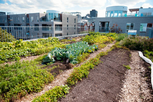Challenges of Urban Agriculture in New York City
Agriculture may seem improbable in New York City, a concrete jungle with millions. There are hundreds of community gardens and rooftop farms, thriving urban farming movement. NYC urban agriculture has great promise for fresh, local produce and environmental advantages, but scaling it is difficult.
Land Availability and Zoning
Always struggling to find sufficient growing space. Weight-bearing rooftop structures are needed for temporary vacant lots. Zoning laws from the industrial era might limit agricultural usage, making permits difficult and expensive.
Financial Health: Costly Urban Farming
Land leases in a city with sky-high housing prices are difficult. Selling produce competitively while covering operational costs is difficult even with a loyal following. Innovative methods like vertical farming with controlled-environment systems require large upfront investments.
Waste Management and Environment
Urban farms have special waste management challenges. Organic stuff like food scraps may be polluted, and composting space is limited. Rooftop farm runoff may pollute waterways and bring rats to highly inhabited areas.
Conclusion: Hope Despite Obstacles
 New York City’s urban agricultural movement shows human creativity and a desire for sustainability. Government and advocacy groups are addressing zoning concerns and helping urban farmers. Space-saving and environmentally friendly mobile rooftop farms and aquaponics systems are emerging. The future will be difficult, but with collaboration and innovation, New York City can continue to lead urban agriculture, proving that nature can survive in a city.
New York City’s urban agricultural movement shows human creativity and a desire for sustainability. Government and advocacy groups are addressing zoning concerns and helping urban farmers. Space-saving and environmentally friendly mobile rooftop farms and aquaponics systems are emerging. The future will be difficult, but with collaboration and innovation, New York City can continue to lead urban agriculture, proving that nature can survive in a city.

